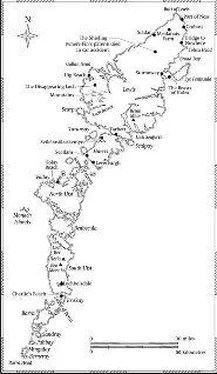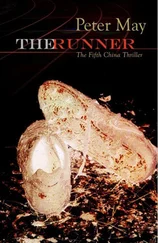Peter May - The Chessmen
Здесь есть возможность читать онлайн «Peter May - The Chessmen» весь текст электронной книги совершенно бесплатно (целиком полную версию без сокращений). В некоторых случаях можно слушать аудио, скачать через торрент в формате fb2 и присутствует краткое содержание. Жанр: Триллер, на английском языке. Описание произведения, (предисловие) а так же отзывы посетителей доступны на портале библиотеки ЛибКат.
- Название:The Chessmen
- Автор:
- Жанр:
- Год:неизвестен
- ISBN:нет данных
- Рейтинг книги:4 / 5. Голосов: 1
-
Избранное:Добавить в избранное
- Отзывы:
-
Ваша оценка:
- 80
- 1
- 2
- 3
- 4
- 5
The Chessmen: краткое содержание, описание и аннотация
Предлагаем к чтению аннотацию, описание, краткое содержание или предисловие (зависит от того, что написал сам автор книги «The Chessmen»). Если вы не нашли необходимую информацию о книге — напишите в комментариях, мы постараемся отыскать её.
The Chessmen — читать онлайн бесплатно полную книгу (весь текст) целиком
Ниже представлен текст книги, разбитый по страницам. Система сохранения места последней прочитанной страницы, позволяет с удобством читать онлайн бесплатно книгу «The Chessmen», без необходимости каждый раз заново искать на чём Вы остановились. Поставьте закладку, и сможете в любой момент перейти на страницу, на которой закончили чтение.
Интервал:
Закладка:
He dropped out of first year at university before Christmas, and I had lost track of him until that phone call at my student lodgings.
‘Donald?’ He sounded different to me.
‘It’s me, bro.’
‘Where the hell are you? I mean, what are you doing?’
I heard him chuckling on the other end of the line. ‘I’m in the music business, bro.’
‘Donald, I’m not your bro!’
‘Hey, Fin boy, keep the heid. It’s just a figure of speech.’
‘What music business?’ I said.
‘Got a job in a music agency. We represent bands, singers, organize tours, negotiate deals with record labels.’ He paused, and I heard the pride in his voice. ‘I’m personal assistant to Joey Cuthbertson, impresario extraordinaire. Amazing guy, Fin. What he doesn’t know about the music business isn’t worth knowing. And I’m going to pick his brains until there ain’t a cell left I don’t possess.’
‘Good for you.’
He laughed. ‘Never could impress you, could I?’
‘Not when you were trying to, Donald. The thing you’ve never understood is that you don’t have to try.’
More laughter down the line. ‘Fin, Joey Cuthbertson’s signed Amran.’ He paused. ‘On my recommendation. They’re going places, boy. Mark my words. I figure we’ll have a record deal before Easter.’
‘Good for them. What’s any of this got to do with me, Donald?’
‘We need a roadie, Fin. Big Kenny’s gone to Inverness, and your name came up. The guys are comfortable with you.’
‘Some of us are still trying to get a degree, Donald.’
‘Nights and weekends, Fin. Good money in it. And, hey, you’ll sail through your degree, bro, without even breaking sweat.’
Donald was wrong about a lot of things. But he was right about Amran. I roadied for them for the rest of that academic year, and we gigged all over Scotland and the north of England. The record deal that Donald predicted came in June. The band spent the summer in the studio recording their first album, which they called Caoran , as a sop to Strings. They were mostly songs on which Roddy and Strings had collaborated, but they were given a real professional gloss by a producer who came up from London. They never did replace Whistler. When their first single was released in September it went straight into the charts at No. 5.
Mairead was turning into a minor celebrity, her face appearing regularly in the Scottish red-tops and on the covers of several nationally distributed magazines. She had her own fashion guru now, at least that’s what Mairead called her. A kind of dusty-looking lesbian art school dropout who advised her on clothes and make-up. I had to pinch myself at times to remember that Mairead was just a wee lass that I’d known and fancied at school.
Roddy’s dad had bought him a second-hand, single-engined aeroplane. A red-and-white Piper Comanche. And the band had started earning enough for Roddy to pay for flying lessons out of Glasgow airport. But Roddy was flying high in more ways than one. He was destined for stardom and recognition of his very special talents. That’s how he saw it, anyway. And it was that overweening ambition that brought him, finally, into conflict with Donald.
By the time I went into second year at university, Roddy and the rest of Amran had dropped out to concentrate on their careers in the band. Joey Cuthbertson had been reduced by a heart attack to little more than an invalid, and Donald had stepped into his shoes as No. 1 at the agency. It seems he had indeed sucked the old man dry.
But although Donald’s dramatic rise to prominence in the Scottish music business had led to a resurgence of interest in mainly Glasgow-based bands like Amran, it also coincided with his spiralling descent into drink and drugs. He had always been, I suppose, a classic contender for that uniquely island condition known as the curam , when childhood indoctrination in unrelenting Presbyterian beliefs resurfaces like a virus after years of dissolute living to reshape its victims in the image of their fathers. In this case, the Reverend Coinneach Murray. But it would be a few years before Donald would find himself following in his own father’s footsteps. For the moment he was having too much fun in denial.
What he had done was taken his eye off the ball, and Amran’s career was starting to stall, even before they had recorded their second album. Success can come in the blink of an eye, but vanish just as quickly, like an evaporating tear. The gigs were routine and repetitive and not serving in any way to advance the band’s career. Donald was never there, never at the end of a telephone, never around to discuss the things that Roddy and Strings and the rest thought important to their future. He had already embarked on that long and treacherous slide into addiction.
For my own part, I didn’t much care. I drove the van, and the money I made meant I didn’t have to think too much about my own future. In truth, I didn’t really want to think about it. I had no interest in my degree course, no ambition, no idea what to do with my life. The news which had greeted me on my return to the island for my aunt’s funeral had robbed me of any interest in it. Artair and Marsaili were married. I had lost my oldest friend, and the only girl I had ever really loved.
The friction between Roddy and Donald finally came to a head one weekend in early November.
It was a Friday night, and Amran were giving a concert in one of those end-of-pier pavilions, a survivor from the days of seaside music hall, rescued from demolition and lovingly restored. It was somewhere on the west coast of England. I don’t remember where, exactly. One of those Victorian coastal resorts that had somehow survived the town hall vandals of the fifties and sixties and retained a kind of faded charm. The original promenade which ran a mile or so along the seafront was still there, and the pier was an elaborate structure of iron struts and girders nearly five hundred feet long. The pavilion itself was a shambles of curved roofs on the T at the end of it, and housed an auditorium with a seating capacity of between four and five hundred. In the summer it hosted those seaside variety shows that still somehow attracted large audiences. But events in November were few and far between.
It was typical of the gigs that Donald had been booking for the band, and Roddy was in a mood even before we set off, determined to have it out with Donald, who had agreed to meet us there.
It was a filthy night, wet and blustery, light fading as we drove into a little town en route, tucked away among the unfamiliar folds of rolling green English countryside. I was peering through my rain-smeared windscreen searching for signposts when Rambo, who always travelled in the van with me, suddenly shouted at me to stop. I jammed on the brakes.
‘What the hell-?’
The car carrying the rest of band nearly ploughed into the back of us.
‘There’s a guy on the bridge.’ Rambo pointed across my line of vision towards the parapet of a bridge that spanned the brown waters of a river in spate. It was an old stone bridge, with lamp posts at intervals across its arch. A man stood up on the parapet wall, one hand clutching a lamp post. He was looking down at the water rushing past below. There was no mistaking his intent. A man steeling himself to jump.
Roddy, Mairead and the others leapt out of the following car and ran round to my door.
‘What’s wrong?’ Roddy shouted.
I pointed over the bridge. ‘Looks like that guy’s about to do away with himself.’
Everyone looked and there was a momentary hiatus. ‘Jesus,’ Roddy whispered. ‘What are we going to do?’
I glanced at my watch. ‘We’re running late already.’
Mairead threw me a look. ‘A man’s life is a little more important, don’t you think, than a gig on a pier?’
Читать дальшеИнтервал:
Закладка:
Похожие книги на «The Chessmen»
Представляем Вашему вниманию похожие книги на «The Chessmen» списком для выбора. Мы отобрали схожую по названию и смыслу литературу в надежде предоставить читателям больше вариантов отыскать новые, интересные, ещё непрочитанные произведения.
Обсуждение, отзывы о книге «The Chessmen» и просто собственные мнения читателей. Оставьте ваши комментарии, напишите, что Вы думаете о произведении, его смысле или главных героях. Укажите что конкретно понравилось, а что нет, и почему Вы так считаете.












